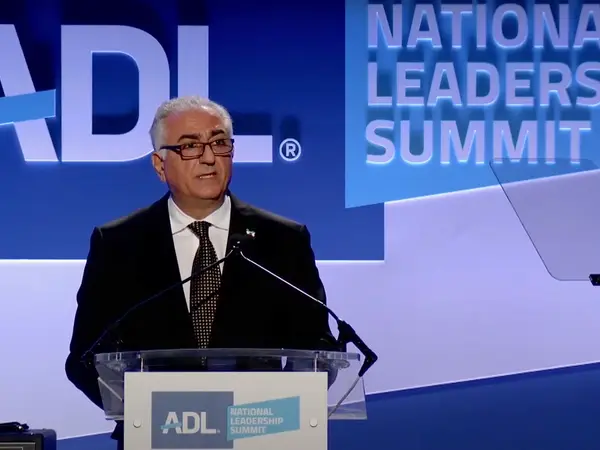Iran’s exiled Prince Reza Pahlavi delivered a speech to over 500 members from one of the leading US anti-hate NGOs, speaking of a democratic, secular Iran.
At one of the world’s leading organizations specializing in civil rights law, Pahlavi made the powerful address in Washington, slamming the regime's campaign of oppressing women and minorities.
Pahlavi, a viable alternative to the regime in the eyes of the Iranian people, spoke of the current women led movement to topple the regime. “Iranian women quickly became the foremost target of the revolutionaries and their new government. They were publicly beaten, harassed, and segregated from the early days of the revolution,” he said, underlining that for four decades women have been systematically disenfranchised by the regime.
He cited that “most notably [women are] legally considered to be worth half of a man” according to the Islamic Republic’s interpretation of Islamic law or sharia, and spoke of the regime’s campaign of bigotry against its minorities.
While he acknowledged the deep anti-semitism and holocaust denial intrinsic to the regime, the hatred does not stop with the Jewish people, Pahlavi also referring to the Islamic Republic’s campaign of bigotry against religious minorities including members of the Baha’i faith as well as Sunni Muslims, who constitute about 10 percent of Iran’s 88 million population.
“Members of the Baha'i faith are punished for their religious beliefs, face government-mandated discrimination in schools and workplaces, and experience property confiscation and desecration of their cemeteries. Sunni Muslims were denied the right to worship in their own mosques. Christians were forced into secretive house churches.”
He also referred to his recent trip to Israel, in which he met with Prime Minister Benjamin Netanyahu among other leading figures and community members. He said: “I visited Israel to stand up against the Islamic Republic's antisemitism, and to stand in solidarity with victims of the Holocaust in the face of the regime's Holocaust denial.”
“I went to mourn with the victims of the regime-sponsored terrorism, but I also went to Israel to stand up for my people, so that there will be no further victims of hate and bigotry,” he added.
He called the historic trip “a new vision for our region, a vision that is not bogged down in the forced ideological divisions of recent decades but instead based on ancient ways of our lands and connections between our people”.
Peace in the region will only be sustainable when a secular democratic Iran joins its ranks, he said.
At the event, marking the 75th anniversary since the founding of the State of Israel, Israel's President Isaac Herzog delivered a virtual message to the attendees about the threats posed by the Islamic Republic to Israel and other countries of the region.
ADL Director Jonathan Greenblatt -- who served as a special assistant to former president Barack Obama and director of the White House Office of Social Innovation and Civic Participation -- spoke of his sympathy for the Iranian people who are suffering from “brutality and oppression of the Islamic regime”.
He went on to speak of Iran’s destabilizing influence across the Middle East and beyond through its proxies. "It is an extremist regime with an ideology as dangerous as Al-Qaeda, because it is unwilling to reconcile societies,” he said. “Indeed, Iran is the leading state sponsor of terror around the world and a country whose number one export is antisemitism.”
Greenblatt hailed Pahlavi, seen by many as a legitimate alternative to the regime, a “catalyst for a free, democratic, and secular Iran; one at peace with its own people, at peace with Israel, and at peace with the world”.
Earlier in the day, Pahlavi slammed a letter by 32 Knesset members to Israeli Foreign Minister Eli Cohen, threatening Iran's territorial integrity. Describing the letter as “completely unacceptable and a service to the interests of the anti-Iranian Islamic Republic regime,” he called it “in total conflict with the positions communicated to me by Israeli leaders and senior government officials.”
